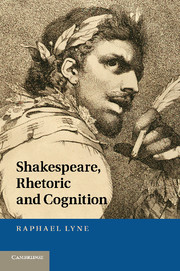Book contents
- Frontmatter
- Contents
- Acknowledgments
- Chapter 1 Introduction: ‘pity, like a naked new-born babe’
- Chapter 2 Metaphor and synecdoche in cognition
- Chapter 3 The drift towards cognition in rhetorical manuals
- Chapter 4 A Midsummer Night’s Dream
- Chapter 5 Cymbeline
- Chapter 6 Othello
- Chapter 7 The Sonnets
- Conclusion
- Notes
- Bibliography
- Index
Chapter 6 - Othello
Published online by Cambridge University Press: 07 September 2011
- Frontmatter
- Contents
- Acknowledgments
- Chapter 1 Introduction: ‘pity, like a naked new-born babe’
- Chapter 2 Metaphor and synecdoche in cognition
- Chapter 3 The drift towards cognition in rhetorical manuals
- Chapter 4 A Midsummer Night’s Dream
- Chapter 5 Cymbeline
- Chapter 6 Othello
- Chapter 7 The Sonnets
- Conclusion
- Notes
- Bibliography
- Index
Summary
Goats and monkeys!
(4.1.263)
Othello makes this exclamation after welcoming Lodovico to Cyprus. The decorum of this official moment has already been interrupted by his dismissal of Desdemona (‘Hence, avaunt!’, 260), and the Venetian official is led to wonder immediately afterwards ‘Is this the noble Moor whom our full Senate / Call all in all sufficient?’ (264–5). It is not clear to what extent ‘Goats and monkeys!’ should be spoken aside. Possibly at this point Othello doesn’t care, and the observers are shocked enough by his actions (‘What? strike his wife?’, 272) that his words don’t add a great deal. Perhaps a phenomenon observed in previous chapters arises here too: at a moment of cognitive intensity, onlookers only partly perceive and hear what is happening. ‘Goats and monkeys!’, however, seems a long way from the probing metaphors and similes of Imogen and Helena, or the unifying discovery of Cymbeline-as-mother. This can still be read as a kind of heuristic process, but it is the end of one that has gone disastrously wrong. The hero’s all-in-all sufficiency, infiltrated by Iago’s preternatural control over the metaphors of cognition, degenerates as the play progresses. The result is a kind of heuristic short-circuit, where rhetoric becomes self-fulfilling and inward-looking, rather than having any capacity to address emerging events.
Critics have often discussed the psychological complexity of Othello, and it is much more liable to be attributed insights into such complexity than A Midsummer Night’s Dream and Cymbeline. Here in a tragedy the examination of tortuous thoughts seems part of the play’s dark duty, rather than a disorienting but delightful enrichment. With its scouring introspections and sharp-edged interpersonal dynamics it has frequently given readers and audiences a sense of inward exposure. Critical accounts have focused more on epistemology (knowledge and proof) and the emotional aspects of power and persuasion. At times their insights have turned towards what this book would claim as a more cognitive interest. Philip McGuire treats the play as an ‘assay of reason’ and his priorities are epistemological. However, at the end of this essay he sees Othello as an exploration of ‘the limits of intelligence and rational cognition in the face of violent passion, deception deftly and most intelligently practised, and the reality of rationally inscrutable human evil’. This chapter’s approach to the play tends, in keeping with what has gone before, to strip out the implications of ‘rational’ and ‘intelligence’, but it shares an interest in the responsive aspect of the play’s dramatised thinking.
- Type
- Chapter
- Information
- Shakespeare, Rhetoric and Cognition , pp. 163 - 197Publisher: Cambridge University PressPrint publication year: 2011



